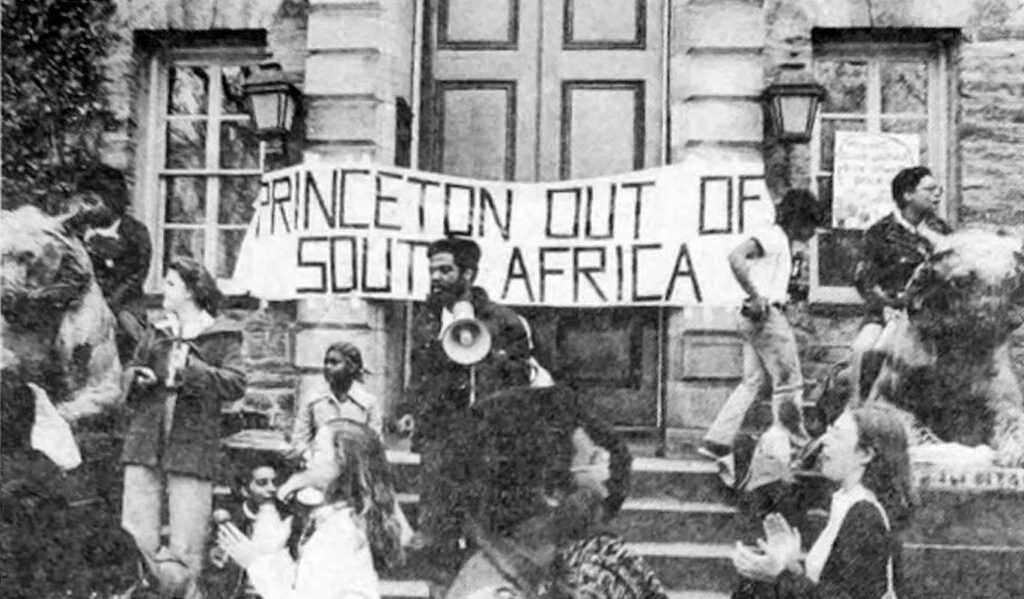
In the spring of my junior year at Princeton, a newly formed student group called the People’s Front for the Liberation of South Africa staged a demonstration outside a meeting of the university’s board of trustees. Their demand was that the university help bring an end to the apartheid regime in South Africa by disinvesting in corporations doing business in that country. The trustees refused, and by the following spring, noisy lunchtime demonstrations in front of the school’s administration building had become a daily event.
The trustees’ position was that divestiture would have a severe impact on the university’s finances while doing little to advance the anti-apartheid cause. They maintained that they could do more good by using their influence as stockholders to pressure the corporations to sever their South African ties.
The demonstrators rejected that argument as mere self-interested rationalization. That may have been so, but I wondered how the demonstrators could be so confident of their own rightness. We were, after all, students — people who presumably were attending this university for the opportunity to learn from people who were wiser and more experienced than we were. If we believed that we knew better, what reason did we have to pay tuition? As someone who knew nothing about corporate investment, I just didn’t feel qualified to take sides in this dispute.
Beyond that, as a philosophy major, I was convinced of the primacy of rational argument. Ideally, if two people have conflicting beliefs, the one who can make a valid argument for his or her belief must prevail, because the laws of logic are unassailable. Unfortunately, as I eventually came to recognize (and as I explored in “Modus Ponens”), rational argument rarely succeeds in real life, because every argument must begin with basic premises accepted by both sides. In a world where people have not only vastly different values but conflicting sets of facts, there’s no set of agreed-upon premises that a logical argument can be based on. In the South African example, both sides could claim — truthfully — to be anti-apartheid, but one side believed in the political effectiveness of free-market capitalism while the other did not. Under those circumstances, there was no way one side could convince the other.
So what do people do when they can’t settle a dispute by means of argument? They do what those Princeton students did: They exercise power. If one side can’t persuade the other of the rightness of their position, they do what they can to force their opponent to yield. In the case of the student activists, the repeated demonstrations — culminating in a sit-in in the administration building — brought the weight of public opinion down onto the university, pressuring the trustees to do what was necessary to protect the school’s reputation. In more extreme cases, the exercise of power may take the form of physical force, property damage, or potentially lethal violence.
My problem with the exercise of power is that it is essentially amoral. Either side can use it, and either side can prevail, regardless of the rightness of their position.
Power was viewed differently in pre-Enlightenment times. When a fight took place between two individuals or two armies, the outcome was presumed to reflect God’s plan. Whichever side was victorious was not just stronger or luckier; they were — by definition — demonstrably right, in that their position must also have been God’s position.
I don’t think anyone believes that anymore. We acknowledge that the outcome of a battle (whether literal or figurative) is arbitrary, and that the difference between victory and defeat is strictly a matter of whose strategy and tactics are more effective. Sometimes the good guys win, sometimes the bad guys win, and there’s not much we can do to change that.
As much as I distrust the use of power to settle conflicts, I recognize that often it’s the only option. In the case of racial justice, Black people — whether in the U.S., in South Africa, or elsewhere in the world — would not have been able to overcome oppression without active resistance in the form of marches, civil disobedience, and sometimes violent clashes with law enforcement. We can all agree with Martin Luther King’s famous quote that “A riot is the voice of the unheard.” And yet, the people who stormed the U.S. Capitol in the wake of Donald Trump’s electoral defeat also considered themselves to be the unheard.
A conflict can be considered to have ended only if one side is able to convince the other of the rightness of their belief. Otherwise, no dispute is ever settled; it just awaits the slow and unpredictable shifts in power from one side to the other.
Recent Comments